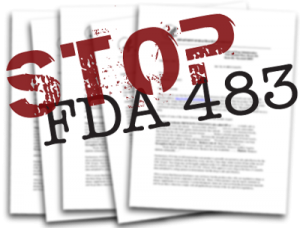Obama Administration Takes Sales Reps’ Side in Overtime Dispute
February 8th, 2012 // 1:10 pm @ jmpickett

New Webinar With Highly Detailed FDA 483/WL Data!
Source: Pharmalot
The US Solicitor General has filed an amicus curiae, or friend of the court brief, and sided with pharma reps. The move is not surprising, given that the US Department of Labor has, several times, taken a similar step in federal courts around the country where cases were heard. In the meantime, the US Supreme Court is preparing to review this very contentious case regarding overtime pay for sales reps.
The review is expected to have far-reaching implications for the pharmaceutical industry, which has been fighting a growing number of cases nationwide over the past several years, but has had mixed results as the issue has continually divided the courts. At the same time, drugmakers have been laying off thousands of sales reps as they try to cut costs and alter their business models.
At issue is whether reps are exempt from overtime provisions of the Fair Labor Standards Act. The FLSA overtime compensation requirement does not apply to employees who work as outside salespeople, but the law does require employers to pay overtime for hours worked beyond 40 hours a week, unless a FLSA exemption applies.
What are those exemptions? If an employee’s primary duty is to obtain orders or contracts (as defined by the statute) and regularly does so away from the employer’s place of business. Drugmakers argue their reps are outside salespeople who close sales because the primary customer is the physician.
However, reps have argued that a direct sale doesn’t occur because medicines are actually purchased by patients and hospitals, which receive the drugs from wholesalers. The Supreme Court will review a case involving two GlaxoSmithKline reps Michael Christopher and Frank Buchanan, whose bid for overtime pay was denied last year by a federal appeals court. Arguments are scheduled for April 16.
In its brief, the Solicitor General maintains that “the FLSA’s ‘outside salesman’ exemption applies to employees who sell goods or services, not to employees who promote goods or services in order to facilitate sales by others.†The Solicitor General also maintains that the Supreme Court should give “judicial deference†to the interpretation of federal law by a federal agency (read the brief).
“We feel gratified that the United States Government has joined the reps in advocating that the outside sales exemption did not apply,†Eric Kingsley, an attorney for the Glaxo reps, tells us. “The Department of Labor, and now the Solicitor General has seen that the 9th Circuit ignored the proper degree of deference to give an agency interpreting its own regulations… We feel confident the Supreme Court will reverse this case.â€
Just two weeks ago, Novartis agreed to a $99 million settlement after a different federal appeals court ruled that its sales reps are not exempt from overtime provisions of the Fair Labor Standards Act and, therefore, should be paid overtime (back story). This was the first time that a drugmaker had reached a settlement.
The US Solicitor General, by the way, was not the only one to file an amicus curaie with the Supreme Court this week. Two prominent physicians – Greg Curfman, who is the executive editor of The New England Journal of Medicine, and Howard Brody, who is the director for the Institute for Medical Humanities at the University of Texas Medical Branch – also filed a brief in support of the reps.
In their filing, they argue that “the decision to prescribe a drug incorporates a number of principal and controlling factors that leave little room for input from (reps). Physician prescribing decisions are governed by ethical considerations, the nature of which prohibits doctors from becoming mere buyers in a drug sales transaction.†They also maintain that “the medical profession has been pushing back against a sales transaction model of physicians’ interactions†with sales reps (read the brief here).
And two former sales reps – Dana Higgs, who worked at Pfizer, and Eugene Kuzinski, who worked at Schering-Plough, also filed a brief in which they say that the responsibilities and background of reps have changed substantially over the past half century; legislative and regulatory actions forced some of those changes; drugmakers have changed the role of sales reps as part of the voluntary industry code and often describe details in regulatory filings. They also maintain that employees in other industries with “similar promotional duties†will be hurt if pharma sales reps are denied overtime pay.
“When I first started, I was one of the few reps that weren’t pharmacists. There were a lot of reps who were pharmacists. And I had a business degree. Now, the reps don’t have business degrees, don’t have pharmacy degrees. Most of them, you know, they can have anything. They can have a degree in physical education and the doctors don’t feel, in general, rely upon the expertise of a drug rep,†Higgs states in the brief (read here).
“We aren’t considered someone that they value for information so much, you know, because the way that we present is not the way we used to before… But it’s not that way anymore. Now its, ‘this is the paragraph you’re going to read. You’re going to go in and your going to tell him this paragraph.’ And it’s going to be the same paragraph the rep before you read, and the rep before him.â€
Thanks to:


